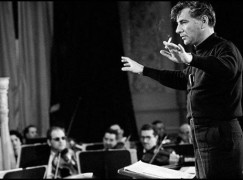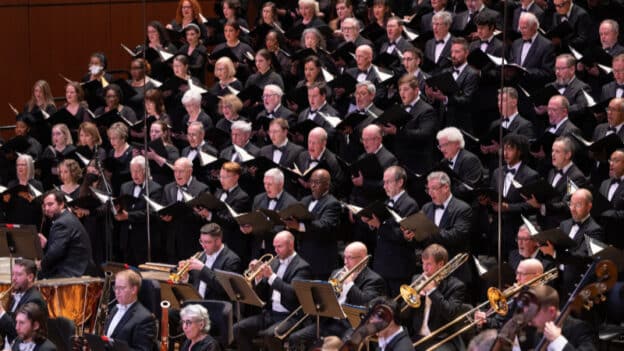How Leonard Bernstein failed to transform the New York Philharmonic
mainFrom Joseph Horowitz’s centennial essay on a failed messiah:
Bernstein’s disappointment upon leaving the Philharmonic was undisguised. He knew that he had failed to transform the orchestra into something dynamically American. He had endured steady complaints—basically valid—that it lacked the gold-standard polish of the orchestras in Boston, Philadelphia, Chicago, and Cleveland. But if his were not the accomplishments he had once envisioned, they were formidable and distinctive. He had not remotely succeeded in canonizing an American repertoire. But, starting from scratch, he had established the iconic importance of Charles Ives. He had singlehandedly canonized Nielsen and helped to restore Sibelius’s luster. And he had left a central legacy honoring a composer and Philharmonic music director far bigger than himself: Gustav Mahler….
Read on here.

And more:
During the Dark Ages of the New York Philharmonic—the music directorship of Zubin Mehta (1978-91)—I would sometimes find myself in the orchestra’s offices. I dreaded seeing the photograph of Leonard Bernstein hanging over an elevator. It was an image whose ebullience provoked a piercing sadness and incredulity. Evidently, Bernstein no longer wanted to take charge of his leaderless orchestra. And the orchestra didn’t want him. In 1984, Bernstein materialized to conduct part of a program celebrating the 60th anniversary of the Young People’s Concerts. Though a film clip of his “Who Was Gustav Mahler?” was shown, Bernstein did not speak. A member of the Philharmonic staff confided to me the reason: Bernstein was “crazy.” He could not be “controlled.”…





It’s a strange claim that Bernstein really boosted Ives, as Ives performances remain thin on the ground. And Nielsen? Nielsen’s place in the canon is generally down to European orchestras and he remains a rarity in the USA. Rumours have flown that Alan Gilbert alienated NY audiences and donors in part by championing Nielsen just as much as any of those later avant-garde composers.
You may be right about Gilbert and Nielsen. But despite the vaunted “Nielsen Project,” he did Nielsen’s symphonies and concertos ONCE. Didn’t even do them on tour. Hard to see how that would have been noticeable enough to be alienating. And it’s hard to see how Nielsen’s wonderful music can be alienating. Only in New York, I guess.
The Nielsen CD cycle recorded on this occasion is, in my humble opinion, the best thing the NYPO have done in decades. I didnt know the audience disapproved.
I had read the arrticle earlier via Arts & Letters Daily (a website wholeheartedly recommended: wwww.aldaily.com) .
It seems obvious to me that the reason B let his earlier idealism for Americana go, was the result of getting more ‘under the skin’ of the older repertoire, which carries a spirit and range of emotional experience which in comparison with much 20C music and with early American music, simply was better. He gradually found that the newer and American music did not match the old European repertoire, and delving in Mahler only reinforced that, in itself disappointing, insight.
If he had lived today, he could have discovered newer generations in America who recover some of the older radiance: Leshnoff, Heggie, Cavaterra, Moravec.
Bernstein’s Nielsen cycle was a landmark moment for the composer. I still will take LB’s recording of the 4th over pretty much anyone else and I have about a dozen recordings of the cycle.